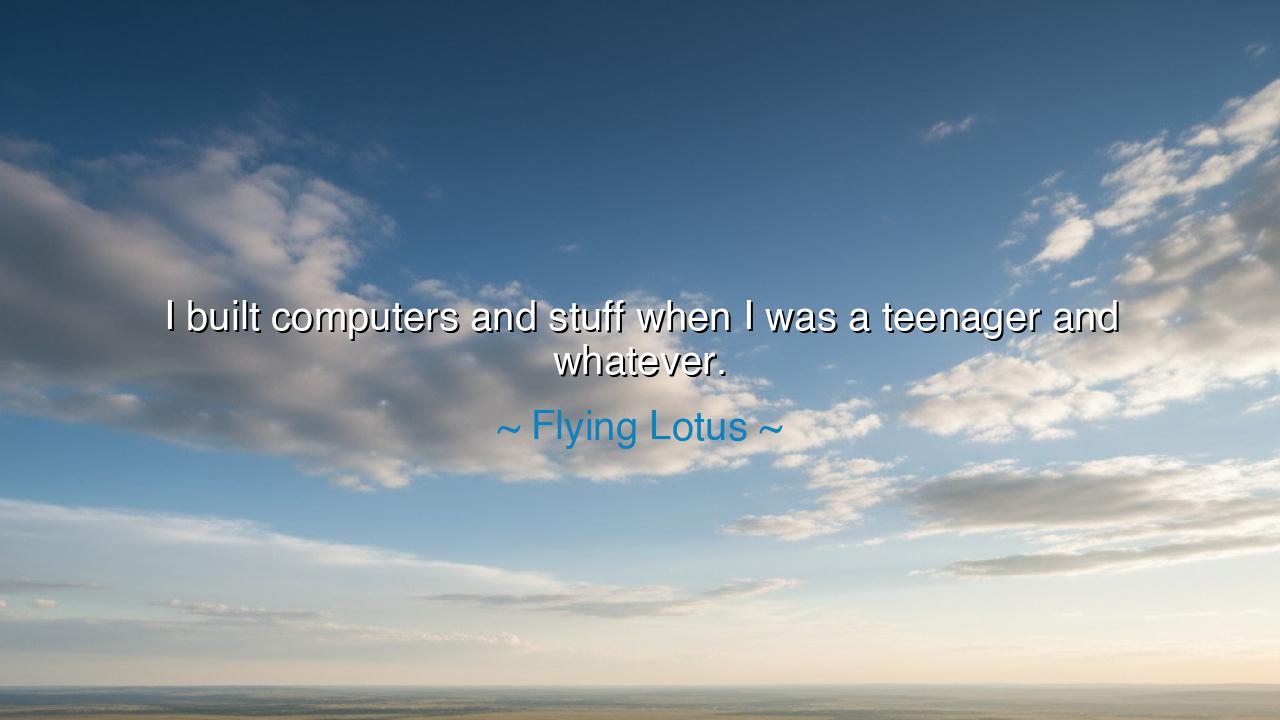
I built computers and stuff when I was a teenager and whatever.






The words of Flying Lotus—“I built computers and stuff when I was a teenager and whatever.”—at first seem casual, almost dismissive, yet beneath this simplicity lies a profound truth about curiosity, creation, and self-directed learning. Even in its nonchalance, this reflection tells of a youth engaged in shaping the world, experimenting with the forces of technology, and discovering through hands-on exploration the power to mold ideas into reality. It is a reminder that mastery often begins not with formal instruction, but with the playful daring to tinker and invent.
In these words, we see the timeless spark of the apprentice and the inventor. The act of “building computers” as a teenager echoes the ancient traditions of mentorship and craft, where knowledge was passed through direct engagement. In the workshops of Athens, the studios of Renaissance Florence, and the laboratories of early alchemists, young minds learned by doing—by constructing, dismantling, and reconstructing. Flying Lotus’ statement, though brief, reflects this enduring principle: understanding comes from interaction, not only observation, and growth comes from boldness in creation.
The origin of this quote lies in the formative years of Flying Lotus, when computers and digital tools were gateways to a universe of experimentation. He approached technology as both a canvas and an instrument, blending imagination with technical skill. The casual “and stuff” belies the seriousness of his endeavor, for even seemingly small acts of building, programming, or manipulating machines lay the foundation for expertise, creativity, and the capacity to innovate. In this, his reflection mirrors the path of countless pioneers who began their journey through curiosity and personal initiative.
Consider the story of Nikola Tesla, who as a boy built small machines, experimented with electricity, and learned through trial and error. Though he did not always fully understand the forces he manipulated, Tesla’s youthful experiments—like Flying Lotus’ “whatever”—laid the groundwork for a lifetime of invention and extraordinary achievement. Both demonstrate that the earliest acts of creation, no matter how informal or playful, can shape the trajectory of one’s life, transforming curiosity into genius.
There is also a philosophical lesson embedded in his words: mastery requires engagement without fear of imperfection. By saying “whatever,” Flying Lotus captures the nonchalance of experimentation, the willingness to explore without being constrained by expectation or immediate perfection. The ancients recognized this as a vital component of learning. The sculptor who chips marble repeatedly, the scribe who writes letters imperfectly, the philosopher who questions endlessly—all practice their craft with the understanding that growth emerges through persistent and fearless experimentation.
His reflection reminds us that creation is often playful before it is purposeful. The casual tinkering with computers as a teenager was both an education and a form of expression, a laboratory for the mind. Like the young artisans who apprenticed in medieval guilds, or the child inventors in the workshops of Renaissance Florence, Flying Lotus cultivated skill through immersion, curiosity, and persistence, even without formal recognition or reward. This is a principle that remains true today: the mind grows when it is allowed to explore freely.
The lesson, therefore, is timeless: do not wait for permission or guidance to create, but begin where you are, with what you have. Experiment, tinker, and build, even if the results seem trivial or uncertain. Every act of exploration strengthens understanding, hones skill, and awakens ingenuity. Flying Lotus’ casual words reveal that greatness often grows from humble beginnings, from the persistent curiosity and playful engagement of youth.
And so, my children, remember this eternal truth: the seeds of mastery are sown not only in formal classrooms or workshops but in moments of fearless curiosity. Take your tools, whatever they may be, and engage with them fully. Build, dismantle, experiment, and fail, for each step carries you closer to creativity, knowledge, and self-mastery. Like Flying Lotus, let your youthful exploration shape the foundation upon which you will construct the extraordinary achievements of your life.






AAdministratorAdministrator
Welcome, honored guests. Please leave a comment, we will respond soon